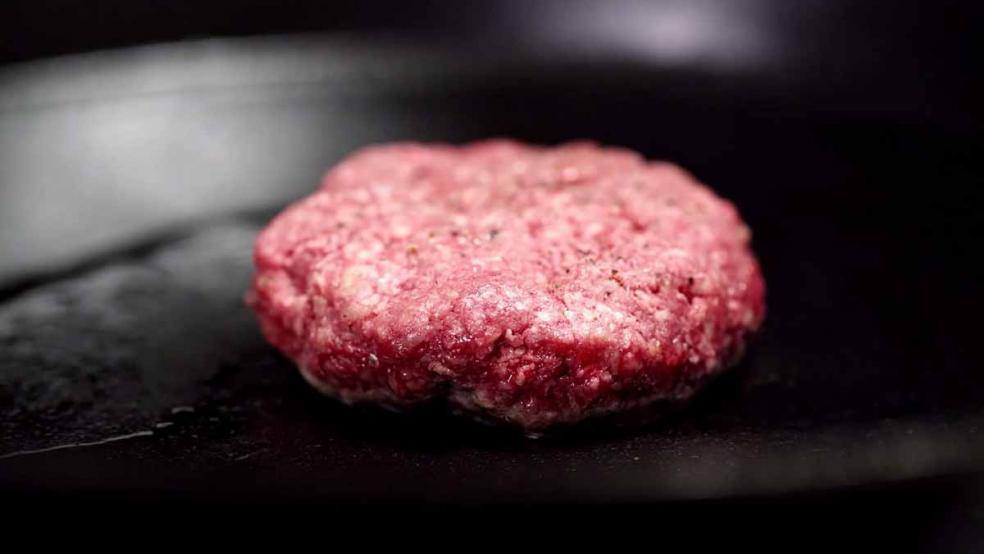It looks, smells, tastes and feels like a beef burger, but it’s made entirely of plant products. Last week’s sizzling launch of the meatless “Impossible Burger” at New York’s Momofuku Nishi restaurant shows just how far the faux meat industry has progressed beyond the tasteless hockey pucks of its early years. It’s also part of a shift towards more meat-like vegetarian food, a move driven by the search for healthy, sustainable sources of protein that taste good and mirror the experience of eating meat.
“You can put a bunch of veggies or black beans in a burger and make something that tastes good, but it’s not the sensory pleasure that people get from meat and dairy products,” says Nick Halla, chief strategy officer of Impossible Foods, a California-based startup that spent five years studying the science of what it takes to replicate the experience of eating meat.
Among its ingredients, the Impossible Burger is made from wheat and potato protein, but the magic ingredient that gives it a meaty look and flavor is heme, a protein abundant in animals that can also be found in plants. Impossible Burger makers extracted heme protein from plants to add to the burger, which gives it a red “bleeding” color when cooked. Coconut oil adds a fatty twist that mimics oozing beef fat.
Related: The Fastest-Growing Food Chains in the US
Apart from the “sensory experience” of having a beef burger without beef, Halla says one of the goals of producing quality veggie meats is to find a sustainable way to meet the demands of a growing world population. The United Nations Food and Agriculture Organization estimates that global meat production from animals will double by 2050, but environmentalists worry about the strain on natural resources that could result. Vegetable-based meats require less water and land and produce less greenhouse gas emissions than their animal-based counterparts.
To expand the market, vegetable meat producers are eying meat-eaters who are looking for healthier options.
“Our target consumer is the carnivore who, like many vegetarians and vegans, loves the taste of meat, but, increasingly, seeks to avoid the health, environmental or animal welfare downsides that come with it,” says Ethan Brown, CEO and co-founder of Beyond Meat, a California-based veggie meat company best known for the Beyond Burger, a vegetable burger that sold out within an hour when it debuted at a Boulder, Colorado Whole Foods in May.
Related: Here’s Why People Want Walmart to Sell Ugly Potatoes
Since moving to a plant-based diet isn’t always an easy switch for carnivores, veggie meat creators are hoping that the taste and feel of their products will make it easier for transitioning meat-eaters.
“They think it’s going to be salads for life, but we like to say you can have your meat and eat it too,” says Sadrah Schadel, co-founder of No Evil Foods, an Asheville, North Carolina-based veggie meat startup. Within just two years since the company was established, it was a finalist in Martha Stewart’s 2014 American Made product awards and supermarkets are selling its products across the East Coast. “We come in as a way for people to transition to more of a plant-based lifestyle.”
The market for “flexitarians” — people who are primarily vegetarian but enjoy the occasional meaty dalliance — is growing as meat consumption in America declines. There are an estimated 23 million flexitarians across the U.S., according to The Washington Post.
And the nation’s first vegan butcher shop, the Herbivorous Butcher in Minneapolis, reports that omnivores make up two-thirds of its customer base.
Related: Would You Buy Meat From a Dollar Store? These Shoppers Are
While some may assume that the market for veggie meats would be skewed towards millennials, Schadel of No Evil Foods says her customers draw from a much wider slice of the population.
“I was surprised by the demographic,” explains Schadel. “We thought we would see people from their early to mid-twenties, and we do see them for sure, but we’ve seen a lot of people in the 55-plus area, which leads us to believe that a large segment of the population is looking for healthy options.”
However, the thought of eating the meatiest–tasting vegetarian food may seem like a contradiction to some. When asked if eating meaty vegetarian food runs counter to the ethos of being vegetarian, Schadel disagrees.
“If people are not going to eat meat on a single day, they’re making a huge impact,” says Schadel, who is vegetarian. “My point of view is that anything that can help people be more open to having a plant-based diet trumps any disadvantages.”




